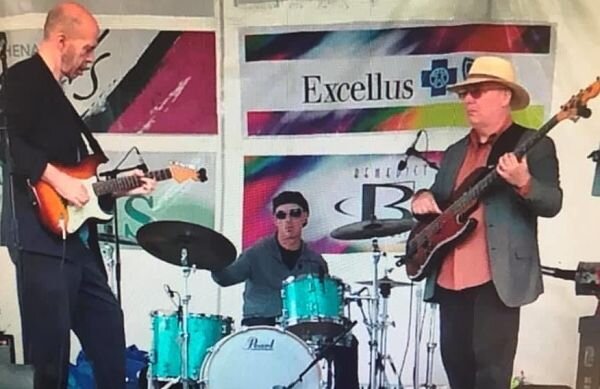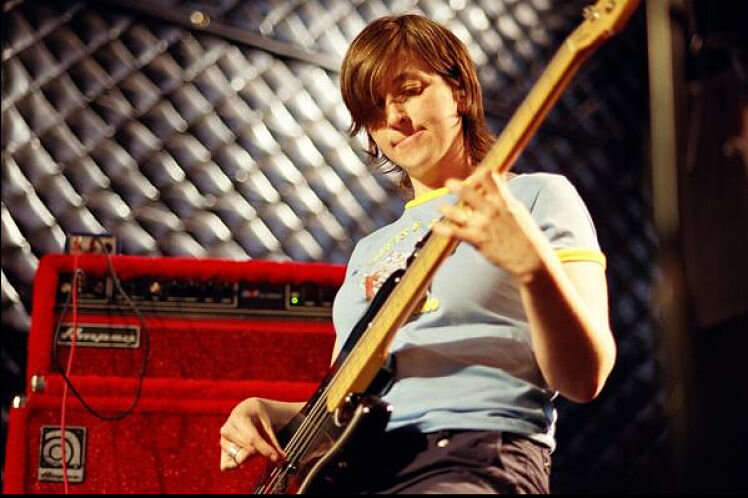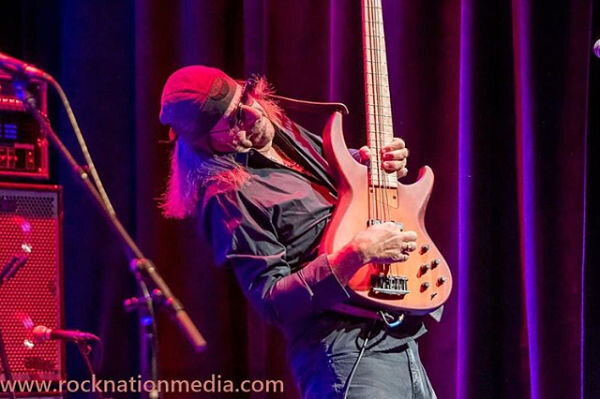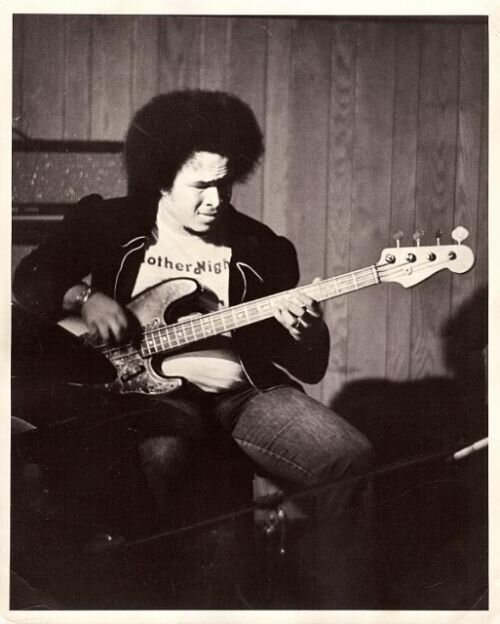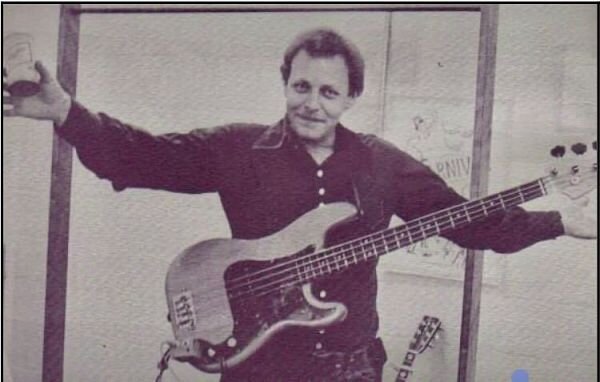Jeff Allen (Chris Botti, Duncan Sheik)


By Tony Senatore
While other bass guitar related websites focus primarily on all things bourgeoisie, Know Your Bass Player’s sentiments have always resided within the proletariat, and the working-class bassists that comprise it. Jeffrey Allen is a prime example of a bassist who has made a name for himself by constantly being able to deliver what his clients need, by selling his wage labor as a commodity. Unlike his radical chic bass brethren who call for a destruction of the very system that provides their sustenance, Jeffrey Allen embraces the best features of our American way of life, and works hard to deliver for those that hire him, whether the gig is a NYC bar, in the pit on Broadway, or on a world tour.
Moreover, in selling his wage labor he does not feel the alienation that Karl Marx said was a feature of a capitalist economy. In this feature, we at Know Your Bass Player want the bass players of the world to unite and come to the realization that they have nothing to lose but their chains. In our new global economy, some might say that all that is solid melts into air, all that is holy is profaned, and man is at last compelled to face with sober senses his real conditions of life, and his relations with his kind. The staff at Know Your Bass Player beg to differ. It is time to break the trend of false consciousness and learn what it takes to make a living as a working musician through the wisdom of Jeffrey Allen.
Tony Senatore, 2020


When and where were you born?
I was born the day after Magical Mystery Tour was released, in the fair city of Englewood, New Jersey, just over a mile away from the house in which I was raised, on November 28, 1967. On another note, Magical Mystery Tour eventually became one of the first cassettes I ever owned, along with the Jackson 5’s Third Album. Those were two tapes I was passionately grooving to as a five year old on my portable cassette player.
Did you study music in college? I am curious as to your educational background, and/or specific teachers who guided you, not limited to only music teachers.
I did. I studied classical string bass at Juilliard with Homer Mensch and Eugene Levinson. I’ve been quite lucky to have had many incredible and influential teachers along the way. When I started playing clarinet in second grade, my very first teacher was the great and legendary reed pedagogue Joe Allard. He lived across the street from us and agreed to my dad’s request to give me a bit of guidance. I was always wildly intrigued by the comings and goings of the various long-haired sax players.
The main electric bass teacher I worked with in high school was a fella named Tony Oppenheim. He had written a very popular slap method book called Slap It! around that time, and my young, white suburban ass wanted to get down! I ended up getting way more than I had bargained for, though. He really was a great and patient teacher—we worked on reading rhythms extensively and other stylistic minutiae, both of which significantly helped me in later years when I started working professionally.
Once I thought I was making some headway on electric after playing for a few years, I thought it’d be cool to try and play upright—in the name of jazz and being well-rounded. Funnily, I started studying with a classical bass teacher, Linda McKnight, who valiantly attempted to teach me how to legitimately play the instrument and launched me into a years-long fascination with orchestral music in addition to the Sisyphean task of trying to make the double bass sound good. Linda was really responsible for me getting my whole upright bass thing going. I started attending Manhattan School of Music on Saturdays (pre-college division) and playing in multiple youth orchestras. All this led me to attending The Juilliard School after graduating high school. Along the way I also studied bits and pieces with Henry Portnoy, Tiny Martin, and Stuart Sankey.


Did your family support your decision to study music at the college level?
Yes, I was amazingly lucky in that regard, although it wasn’t exactly a straight line. They were initially less enthusiastic when I was only playing electric. I wanted to play rock and become a session musician. But as the classical thing took hold and I started achieving certain goals, culminating with getting into Juilliard, their tune started to change. I think it was a combination of their pride in me, the prestige of the institution, and their view of classical music that precipitated the shift. But they continued to be unbelievably supportive even after I finished school and pivoted back toward playing popular music. For this I’m incredibly grateful.
Do you make your entire living playing music?
I do and have for the past approximately twenty-five years, although this current Coronavirus disruption is poised to possibly change that. We shall see. Your classical training is a big part of who you are. How has your classical training helped you in your pursuit of making a living as a professional bassist? It has and it hasn’t. It certainly gave me a great foundation in being able to read well, understanding traditional harmony, appreciating western classical music, and playing the double bass in a reasonably effective manner. But I also learned many valuable skills in the trenches and clubs freelancing in New York City, playing in a wide variety of bands, as a rhythm section player, playing with great drummers, playing under the microscope of the studio, dealing with a wide range of different personalities and situations, being able to read and provide what’s necessary in one situation but not in another. I could go on and on.
Who influenced you coming up, regarding bassists that caught your ear? When you listen today, do your early bass influences measure up to your perceptions of them when you were young?
Early on it was: Gene Simmons, Michael Anthony, Geddy Lee, Steve Harris, and Chris Squire.
As I got a bit further along in playing the instrument: Jaco, Stanley Clarke, Marcus Miller, Will Lee, Anthony Jackson, Paul McCartney, Pino Palladino, Edgar Meyer, Eddie Gomez, Ray Brown, and Paul Chambers.
That list continued to grow consistently as I learned more, was exposed to more, researched more: Larry Graham, Verdine White, Louis Johnson, Rocco Prestia, James Jamerson, Duck Dunn, George Porter, Me’shell Ndegeocello, Nathan East, so many others. I’m still discovering and cluing in to great bass players that make me feel something physically: Keni Burke, Bobby Vega, Rusty Allen, Derek “D.O.A.” Allen, Leon Sylvers III, Sharay Reed, my homie and fellow Bergen County native Jonathan Maron. Once again, I could go on and on.
More often than not, my early perceptions are affirmed when I listen today, and a lot of the time I get even more out of it, as I have a much broader context and understanding.


Are there any bass players or musicians in general that inspire you today?
Man, I get inspiration from all sorts of things these days, both musical and nonmusical. I’m sometimes impressed with just how severe and athletic many people’s technique has become. But generally speaking, I find beauty in simplicity and understatement—be it in a lyric, a melody, a chord sequence, or a repeating pattern in nature. I’m still moved by a lot of the music I’ve been listening to for years, like Stevie Wonder, Tom Petty, and the Beatles. I just love good songs and songwriting. A few years back I discovered a cool band called MuteMath. They embody many things I enjoy in popular music (cool writing, great sonic palette, awesome rhythm section playing) and I find them compelling. I’m also frequently inspired by many of my colleagues here in New York—so many incredible, adventurous musicians and bass players.
I am sure that like me, you have many basses. I have about forty, but I could exist with only my 1973 P bass if I had to. What bass that you currently own is your main instrument that you would never part? I
I have several incredible instruments, both vintage (Fender, Gibson, Hofner, Kay) and modern (Sadowsky, Musicman, F Bass, Lakland). That’s really a hard question to answer, but if I had a gun to my head, I’d say my ’65 P Bass and my ’66 Jazz Bass. They’ve been with me for a long time and are staples in creating the sounds I envision in my head a large percentage of the time. That said, some of the hollow body basses I have also see a lot of action, and there are many situations where one of my modern instruments is absolutely the right thing. That’s a part of the creative process I always enjoy—choosing the right sound and casting the right instrument that will work best in the context of what else is happening in the arrangement and how the part itself is operating within. Fun times!
Mark Twain once wrote, “Travel is fatal to prejudice, bigotry, and narrow-mindedness, and many of our people need it sorely on these accounts. Broad, wholesome, charitable views of men and things cannot be acquired by vegetating in one little corner of the earth all one’s lifetime.” I know you have done a lot of traveling in your career. Does this quote resonate with you? If so, please explain.
I absolutely love this quote and often refer to it when meeting people from various parts of the world. There’s no better way to expand one’s view of humanity or the world in general than seeing, experiencing, and being exposed to cultures and viewpoints that are different from your own. It saddens me that more people don’t recognize this. When you travel, you learn, in real terms, that the commonalities between people are way more substantial than the obvious differences.


Do you have any significant gig nightmares or stories from the road that you would like to share?
The nightmares I’ve tried to forget and any specific stories are either not appropriate for this venue or you’d have to ply me with alcohol to shake them loose.
When I went back to school from 2008 to 2017, my goal was to teach history or social studies at either a public or a charter school. This changed when I consulted with some of my friends who have been educators for many years.
They informed me that changes in the education system, and the advent of Common Core standards pushed them into early retirement, and that if I had any ideas about teaching with my own style in my effort to change the world one student at a time, I should reconsider teaching. In a similar way, I feel the same obligation to be honest which young musicians that often asks for my advice regarding a career in music.
It is more difficult to survive playing music today than in past eras. Reality is not negativity, and I feel an obligation to young musicians to make this clear. If you could offer one piece of advice to aspiring bassists, what would you tell them?
I would say, have other skills you can use to make money in addition to pursuing music. Or, at the very least, develop multiple skills within music to increase your potential earning capability. I hope I’m wrong, but the ongoing devaluation of creative content in our culture will continue to make it harder and harder for creative people to monetize their creativity, thereby making it more and more difficult to make a living.
Jeff has had the good fortune and pleasure to perform and/or record with some truly great musicians, singers, producers and songwriters over the last several years: Billy Preston, Rosanne Cash, Duncan Sheik, Chantal Kreviazuk, Chris Botti, David Garrett, Marc Cohn, Vanessa Carlton, Stewart Copeland, Five For Fighting, David Sancious, The Dragonflys, Leonard Bernstein, Avril Lavigne, Linda Eder, Lesley Gore, Bill Deasy, Susan McKeown, Donna Lewis, Phoebe Snow, Joan Osborne, Paul Buchanan (The Blue Nile), The BoDeans, Edie Brickell, Lucy Woodward, Mandy Moore, Graham Colton, David Johansen (New York Dolls), Sloan Wainwright, Black 47
BROADWAY SHOWS: Spring Awakening, Spiderman, Beautiful, Finding Neverland, Book Of Mormon, Kinky Boots, Hamilton, Dear Evan Hansen, Waitress, Tuck Everlasting, School Of Rock, The Band’s Visit, King Kong, Ain’t Too Proud, Moulin Rouge,Jagged Little Pill
FILM SCORES: Caught, Hurricane Streets, Safe Men, Girl Fight, State And Main, Wet Hot American Summer, Old School, The Deep End, The Bee Season, Hope Springs, The Secret Life Of Walter Mitty, Zoolander 2, Keeping Up With The Joneses, A Dog’s Purpose, Book Club (2018)





